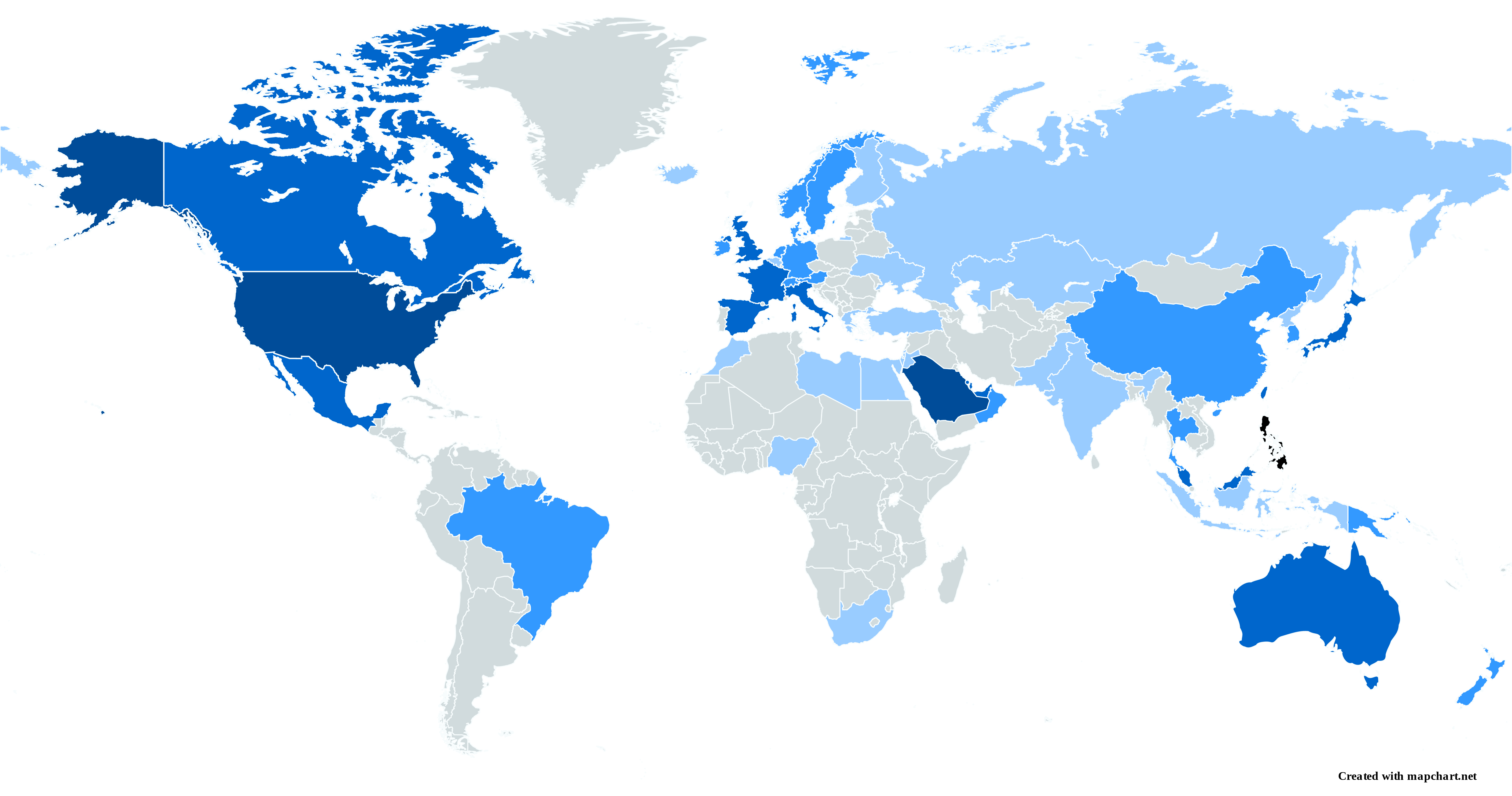Photo credits: Map of Filipino Diaspora by MrStephenLeon
Overseas Filipino Workers comprises a vital part of the global workforce, playing an important role in various global industries. Here are some insights on the significant facts of OFWs:
-
Community Network: Many OFWs actively engage in community network initiatives, both within their host countries and upon returning to the Philippines. They bring invaluable experiences and skills, enriching local communities and fostering growth.
-
Global Footprint: Filipino workers are employed across diverse geographic and industries such as construction, healthcare, hospitality, domestic services and maritime roles. According to Statista, between April and September 2022, the majority of OFWs are located in Asia and the Middle East at 80.8%, 9 % in Europe, 6.3 % in North and South America, 2.9% in Australia and 1% in Africa.
-
Endurance and sacrifices: OFWs often endure with emotional toll of separation from their families for extended time, confronting work environments, adapting to new cultures, and following new laws. Other challenges include, discrimination, homesickness, and difficulties in obtaining employment benefits and contracts. Further, there are cases of abuse, human trafficking and exploitation, particularly those working in (Europe Middle East and African) EMEA or middle eastern countries.
-
Professional development: Working abroad offers OFWs opportunities for career progression, cultivation of professional networks and skills enhancement. Their return to their home country typically provide the local job market with enriched global perspectives and expertise.
-
Economic Powerhouses: OFWs send remittances that serve as a lifeline of many families, These financial inflows contribute to the country’s growth and stability. Aside from supporting their families, the PNA (Philippine News Agency) reports that remittances from OFWs equals 8.9% of the Gross Domestic Product (GDP) and 8.4% of Gross National Income (GNP). In addition, OFWs, also contribute to their local communities through infrastructure projects, real estate and small businesses.
-
Government support: To address the challenges faced by OFWs, the government has implemented various programs and services to protect their rights and welfare. For example, DMW (formerly POEA) provides pre-employment orientation seminars (PDOS), job placement services and legal assistance to OFWs. The DFA built consular offices in major cities to provide assistance.
-
Increasing in numbers: The number of OFWs are on the rise every year. According to POEA (Now DMW) more than 1.8 million Filipinos (hires and rehires) left the country for work in 2015. This yearly increase indicates that income in the Philippines might not be at par with overseas countries.
-
Middle East still the top destination: Countries in the Middle East include Saudi Arabia, Qatar, Bahrain, UAE, Oman, Kuwait tops the OFWs’s destinations. The reasons for these are increasing construction and tourism projects. For example, Saudi Arabia has already started the project “Neom or the Line” and other megaprojects such as the world’s tallest projects and Al Bant Port.
-
OFWs apply through recruitment agencies: Many OFWs choose to go through licensed recruitment agencies or legit overseas manpower agency to process their placement overseas. These legit manpower agencies assist OFWs in navigating the complex process of securing employment in other countries, ensuring legal compliance and providing support throughout the recruitment and deployment stages.
-
Former OFWs: Upon their return, some ex-OFWs opt to settle in the Philippines permanently for various reasons, such as completing their contracts, embarking on a career change, furthering their education, pursuing business ventures, seeking local employment, or simply taking a break.
-
Expectations vs Reality: Expectations vs Reality: While many people expect Overseas Filipino Workers (OFWs) to earn a substantial income, the truth is that not all OFWs achieve financial stability. Despite spending years or even decades working abroad, some OFWs find themselves facing financial challenges.
The high costs of living and housing rentals often exacerbate their financial burdens, unless the company covers housing expenses or refrains from deducting them from their salaries. Additionally, skilled OFWs typically earn more and may benefit from certain visa privileges, in contrast to their non-skilled or low-skilled counterparts.
Overseas Filipino Workers (OFWs) extend beyond their individual endeavours, permeating the very fabric of the global workforce and the Philippine economy. Their unwavering dedication, resilience, and sacrifices serve as a testament to their pivotal role in bridging nations and uplifting communities. As they continue to navigate the challenges of working abroad, their impact resonates profoundly, enriching both their host countries and the Philippines.

